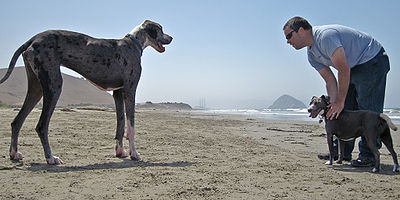Fear, anxiety, these are emotions we’ve all experienced. Our dogs may also feel fear at some time in their lives – fear of objects, places, people, other animals. Most of the time the fear is short-lived and soon forgotten. But some fears, especially those due to traumatic experiences, are triggered each time the dog experiences the some or a similar event. The fears can turn into real phobias and cause physical responses which can have long-term effects.
Chronic stress induced by fear and phobias such as anxiety due to a thunderstorm or separation anxiety has an impact on a dog’s emotional and physical well-being. Some reactions to fear/stress can be panting, shaking, trying to hide, tail tucking, urinating/defecating inappropriately, howling, crying or whining.
Some dogs will try to get as close as possible to their humans. Other dogs will attempt to escape the fear, even breaking windows or digging under or jumping over fences, and may injure themselves.
Still others will assume a rigid position, freezing in place.
While some events that trigger the fear response can be avoided, ie: the garbage truck usually comes around the same day and time, there may be no advance warning of other triggers.
A dog’s reaction to fear can eventually cause nerve damage and affect his/her immune system, inviting illness.
Treatment can include desensitization, using positive associations when the fear response occurs such as playing a game, using the TTouch method of massage, calming herbs, essential oils such as lavender, wraps like the Thundershirt, essences such as Bach Rescue Remedy.
For more information on how to calm your dog during specific events, please read our articles listed below..
Calm Your Dog
Dealing With Separation Anxiety
Calming Your Dog’s Fear of Loud Noises
Relieving Pet Stress
Calming Shirts for Pets
You may also be interested in reading holiday articles, especially about July 4th.


